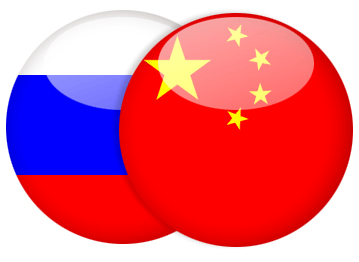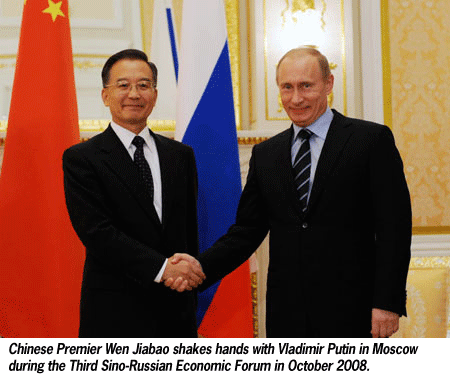Will Russia Expand
China Trade
 Russia
has repeatedly pledged to expand its trade with China, as the Kremlin
appeared to view these commercial ties as an important indicator of
what was officially described as the bilateral strategic partnership. Russia
has repeatedly pledged to expand its trade with China, as the Kremlin
appeared to view these commercial ties as an important indicator of
what was officially described as the bilateral strategic partnership.
Although bilateral trade was adversely affected by the global economic
downturn, Moscow also achieved a sizable surplus in its trade with
China in 2009.
Last year, bilateral trade between Russia
and China declined: reaching $38.8 billion, or some 32 percent down
year-on-year, according to Russian and Chinese statistics.
Chinese exports to Russia, which totaled
$17.5 billion or 47 percent down year-on-year, according to Russia’s
trade representative in Beijing Sergei Tsyplakov. Russian
exports to China amounted to $21.3 billion or 11 percent down year-on-year,
he explained. Russia also recorded a healthy $3.8 billion surplus
in its trade with China, Tsyplakov noted.
Tsyplakov said that from September 2009,
Russian exports to China began increasing. Notably, in the fourth
quarter of 2009 Russian exports were 21.1 percent up year-on-year
and the figure was 53.6 percent up year-on-year last December, he
said. Increased Russian exports to China, including crude oil, metals
and metal ore, came to indicate signs of recovery in bilateral trade,
Tsyplakov argued.
High growth rates in Sino-Russian commerce
were seen by Moscow as an important indicator of the state of bilateral
partnership. In 2006, bilateral trade amounted to $33.4 billion or
some 15 percent up on the previous year. Russia’s trade turnover
with China exceeded $29 billion in 2005, up by 37.1 percent year-on-year.
 In
January 2006, the then Russian President Vladimir Putin announced
plans to raise bilateral trade to between $60 to 80 billion annually
by 2010. Initially, both countries appeared to rapidly progress towards
achieving that goal. In 2007, Russia’s trade with China reached
$48.16 billion or 44.3 percent up year-on-year. In
January 2006, the then Russian President Vladimir Putin announced
plans to raise bilateral trade to between $60 to 80 billion annually
by 2010. Initially, both countries appeared to rapidly progress towards
achieving that goal. In 2007, Russia’s trade with China reached
$48.16 billion or 44.3 percent up year-on-year.
In 2008, the level of bilateral trade
reached $56.8 billion or 18 percent up year-on-year. As a result,
China emerged as Russia’s third largest foreign trade partner,
while Russia became China’s eighth largest trade partner. However,
in the second half of 2008, trade between Russia and China apparently
began to slow down against the background of the global economic downturn.
Not surprisingly, last year bilateral commerce fell below $40 billion
or well below the level of 2007.
Russian officials conceded that bilateral
trade is unlikely to recover this year. In 2010, Russia’s trade
with China is not expected to exceed $46 billion, Tsyplakov said.
The pre-crisis trade turnover of $56 billion may be reached in 2011
or 2012, he argued. Russia achieved a sizable surplus in its trade
with China mainly caused by falling machinery exports from the country
due to weak demand in Russia. In contrast, Russian energy exports
to China were rising.
From January to October 2009, oil deliveries
to China totaled 13 million tons, according to Tsyplakov. Consequently,
Russia became China’s fourth largest oil supplier. In 2009,
Russian oil supplies amounted to 7.8 percent of China’s total
oil imports, up from 6.5 percent in 2008. In March 2009, Russia resumed
its electricity exports to China following a prolonged hiatus. This
occurred in the context of the long-standing saga of Russian power
supplies to China.
Moscow and Beijing have long discussed
electricity trade. In the mid-1990’s, they discussed a joint
project to build a 2,600-kilometer power transmission line from the
Irkutsk region in Siberia to China at a cost of $1.5 billion. However,
both sides never agreed on pricing and later abandoned the project.
In November 2006, Moscow and Beijing
reached a deal to raise annual exports of electricity from Russia
to China to 3.6-4.3 billion kwh/year in 2008 to 2010, and 18 billion
kwh in 2010 to 2015, and eventually up to 60 billion kwh. However,
three years ago Moscow’s plan to boost its electricity exports
was dealt a major blow. From February 1, 2007, China refused to import
Russian electricity, thus leaving Russian hydropower plants without
a market to sell their surplus electricity.
However, both sides managed to resolve
their differences, and in 2009 Russian suppliers exported about 900
million kwh to China. Russian energy companies now reportedly aim
to export 60 billion kwh by 2020.
Russian and Chinese trade statistics typically do not include armament
sales figures.
However, Russian arms supplies to China
were apparently also in decline. Russia's state-run arms export company
Rosoboronexport, the country’s predominant weapons exporter,
conceded that its arms exports to China were falling. On January 28,
Rosoboronexport's head Anatoly Isaikin said that China’s share
in Russian arms exports fell by 18 percent. China has been cutting
its arms imports and instead focusing on military technology transfers
and the development of domestic arms production, he said. In the early
2000’s, Russia earned up to 40 percent of its arms exports revenue
from sales to China.
Therefore, trade in industrial commodities
between Russia and China apparently declined due to the adverse effects
of the global economic downturn. Meanwhile, Russia has continued to
increase its energy supplies to China.
Gordon Feller
|




